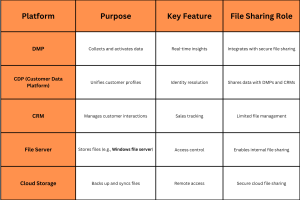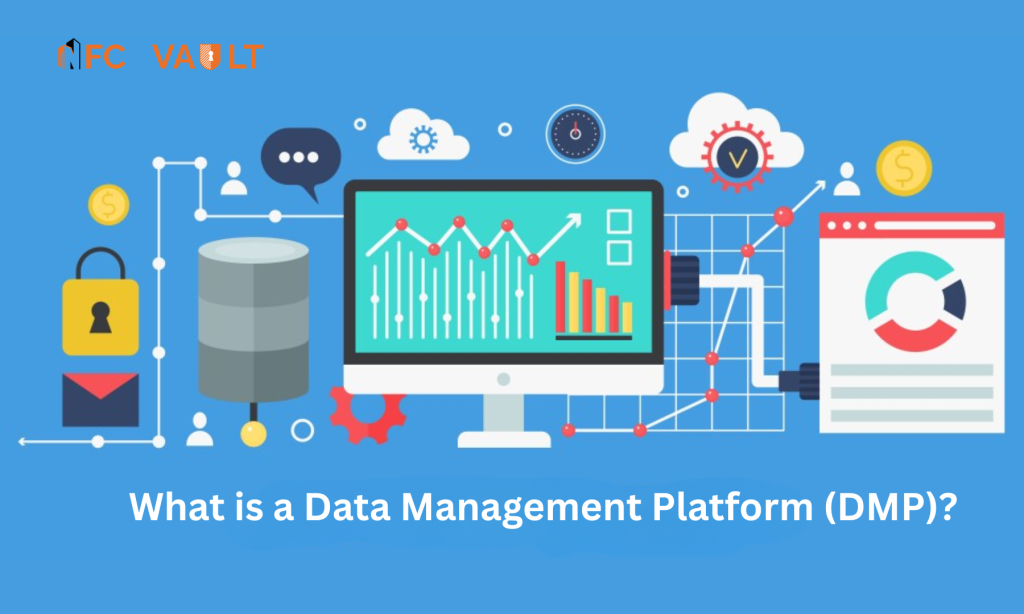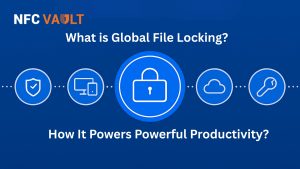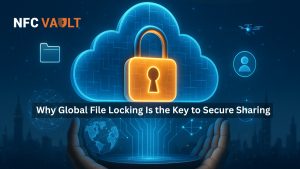Businesses in the big data and digital transformation era gather enormous volumes of data daily from operational workflows to customer interactions. But merely gathering data is insufficient. Organizations use a powerful tool known as a Data Management Platform (DMP) to transform this data into insights that can be put into action.
What is a DMP?
Data management platform is any centralized infrastructure that collects, organizes, stores, and activates data coming from multiple sources. Thus it helps the business in customer audience analysis, secure file sharing, and tailored advertising.
Consider a DMP to be the command center for your company’s data. It creates unified customer profiles and streamlines business operations by combining data from CRMs, websites, mobile apps, file servers, and cloud platforms.
What Makes Data Management Crucial?
Without effective data management, companies find it difficult to:
- Recognize the behavior of their customers
- Ensure secure file sharing for business.
- Observe data privacy laws such as GDPR and HIPAA.
- Expand operations to several groups or regions.
Businesses can guarantee safe and effective data access by utilizing a data management platform to enforce data security, expedite multi-site file collaboration, and even improve global file locking mechanisms.
Essential Elements of a Data Management Platform
The following essential elements typically make up a strong DMP:
- Layer for Data Collection
The DMP gathers information from a plethora of sources, including marketing platforms, websites, mobile apps, file-sharing servers such as Windows file servers, and cloud storage options such as Dropbox.
- Data Organization Layer
After collection, data are arranged in the DMP into structured profiles. These include user access logs and file metadata, behavioral patterns that might affect business decisions or ensure secure cloud file sharing between teams.
- Data Activation Layer
DMPs don’t just store data for later use. DMPs activate data for campaigns, compliance, and operational workflows by integrating with cloud platforms, secure file-sharing platforms, or marketing automation tools.
Secure File Sharing and DMP: The Perfect Match
Enterprise secure file sharing solutions heavily rely on a modern-day DMP. Here’s how:
- Centralized Access Control
An organization can decide who accesses what and when from a given location by linking its file storage such as Windows file sharing, collaboration platforms, etc., to a DMP. This is the best choice for secure file sharing that is self-hosted.
- Enhanced Adherence
DMPs provide data access monitoring and movement and the necessary audit trails that are vital for the secure files ensuring HIPAA compliance.
- Immediate Analytics
To support multi-sites file collaboration and maximize efficiency, it is important to monitor usage, location sharing, and editing of files.
Use Case in the Real World: Integration of NFC Vault & DMP
NFC Vault is one of the top platforms for secure file sharing that makes use of data management capabilities by providing:
- End-to-end encrypted file sharing
- Role-based access controls
- Version history and global file locking
- Connectivity to Windows file servers
- Support for internet file servers and cloud storage solution
In conjunction with a data management platform, NFC Vault assists businesses in:
- Document access should be centralized.
- Assure secure file sharing in the cloud for companies.
- Automate workflows related to permissions and compliance.
- Lower the chance of security lapses or unauthorized distribution
Businesses that handle massive amounts of data across several departments or geographical locations will particularly benefit from this combination.
Advantages of DMP Use
- Improved Data Security
Through the integration of data classification, access control, and encryption, a DMP assists companies in maintaining secure file sharing protocols.
- A unified perspective on data
By combining data from various sources such as CRM, analytics, file server Windows, and cloud tools, DMPs remove data silos.
- Enhanced Cooperation within the Team
By ensuring that everyone, regardless of location, works with the most current and pertinent data, DMPs facilitate multi-site file collaboration.
- Improved Marketing Campaigns
Marketers can enhance ROI, personalize messages, and better segment users with rich data insights, all while maintaining secure cloud file sharing with partners and vendors.
- Complying with regulations
The act of secure file sharing, with GDPR-ready logging, and privacy settings, helps organizations in conforming to data regulations.
DMP vs. Other Data Tools
Let’s break down how a DMP compares to other common data platforms:

How to Choose the Right DMP
A few tips:
- Look for integration possibilities with your current tech stack (e.g., file server Windows, cloud storage solutions, CRM).
- Choose platforms with strong encryption and access control policies.
- Look for platforms that offer real-time analytics and multi-site file collaboration.
- Check for HIPAA/GDPR compliance in case of dealing with sensitive data.
Who Needs a DMP?
Whether you’re a startup scaling fast or an enterprise with global offices, you likely need a DMP if:
- You handle a large volume of customer, marketing, or operational data
- You use internet file servers or cloud storage platforms
- You need a secure file sharing service for business
- You manage compliance (HIPAA, ISO, GDPR, etc.)
Especially for industries like healthcare, BFSI, legal, and education, a DMP paired with a secure platform like NFC Vault is not just valuable, it’s critical.
Final Thoughts
A data management platform (DMP) is the backbone of any modern data strategy. When integrated with a secure file sharing solution in the form of NFC Vault, it allows organizations to treat data smartly, secure it, and keep it compliant.
You have to step up from regular cloud storage or basic open-share links if your business is into sensitive information, complex workflows, or real multi-location collaboration. Explore the best secure file sharing service for business by combining the powers of data management and end-to-end encrypted file sharing.
You can also read this blog: Why NFC Vault is the Ultimate Secure File Sharing for Business
FAQs
Q1. What is the most secure file sharing service for business?
NFC Vault is among the top platforms offering secure cloud file sharing for businesses with enterprise-level encryption and RBAC.
Q2. What is Windows file sharing security?
It refers to access control, permission levels, and encryption when sharing files over Windows file server systems.
Q3. How do I share files securely online for business?
Use platforms like NFC Vault or Dropbox, implement password-protected links, set expiration times, and enforce access control via DMP integration.
Q4. What is a self-hosted secure file sharing platform?
It’s a private deployment of a secure sharing tool like NFC Vault, allowing full control over data hosting and access.



